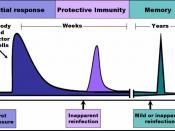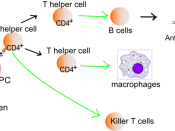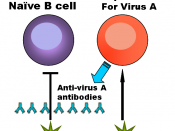Immunology is the study of the immune system. Immunology began in the 19th century and up to the early 1960's immunology was a "descriptive" science, but in the last 20 years thanks to the tools of modern science, genetics, and biology we have a much better understanding of the immune system. The immune system is like a surveillance device that all vertebrates have, this surveillance device protects them from pathogenic (disease-causing) microorganisms; like parasites, fungi, bacteria, viruses and from cancer cells. All of these infectious microorganisms can cause damage and if let unchecked they can multiply and sooner then later kill their host. Our immune system can spot out any of these foreign invaders and once it does it will selectively kill them.
Our immune system's power to protect vertebrates from diseases is thanks to its dual systems that both maintain the necessary defenses against outside substances. One of the dual systems is called the cellular immune response which is more effective against unidentified tissues, cancer cells, fungi, and parasites.
The other system is called the humoral immune response which defends more against the extra cellular phases of bacteria and viral infections. The cellular immune response system exists in the lymphoid system. The humoral immune response system is located mostly in the serum. Serum is the fluid residue of blood after its cells have been removed by clotting. The reason why the immune system has dual
systems is because there are two indistinguishable lymphoid cells, called lymphocytes.
One Class of lymphocytes is the T cells which activate the cellular immune response. When an organism is invaded by a foreign molecule the T cells will recognize it and turn on and start a reaction by binding and eliminating the substance. The other class of lymphocytes is the B cells which...


